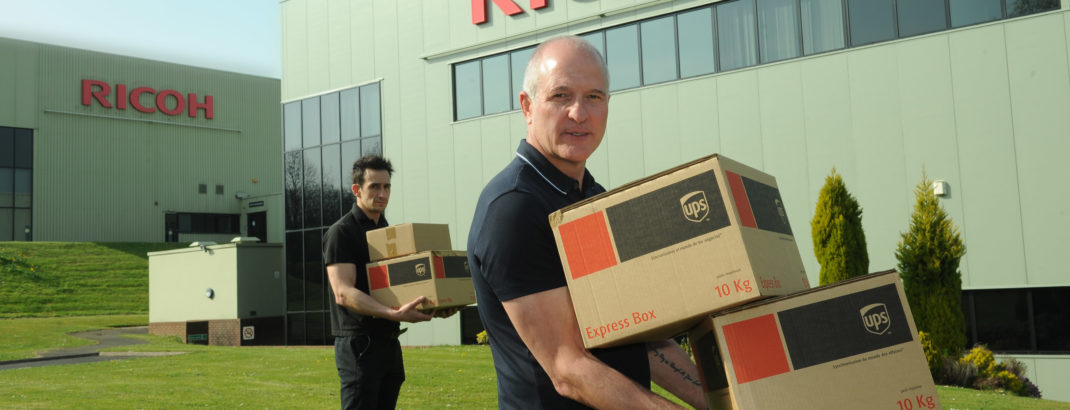Football legend Steve Bull has visited a 3D printing specialist to collect desperately needed face shields for New Cross Hospital in Wolverhampton.
The former England star, Steve Bull, visited Ricoh 3D’s Telford base to collect 250 specially designed masks for Black Country hospitals including New Cross, Walsall Manor and Russells Hall.
Ricoh 3D was quick to respond to Steve Bull’s plea for full face protection for doctors and nurses at New Cross to help in the battle against COVID-19.
Ricoh 3D has used its innovative technology to design and produce the reusable face shield, which has been tested by staff at The Royal London Hospital who commented on its comfort over existing equipment .The company is now in discussions with medical establishments and NHS Trusts across the UK about supplying the face shields. It has the capacity to produce upwards of 40,000 a week.

Steve Bull, who scored more than 300 goals for Wolves, said: “I’m delighted that Ricoh 3D has made this donation. It will make a tremendous difference to the NHS staff on the frontline.
“One of my oldest friends works at the hospital and she told me they are in desperate need, so I knew I had to try and do something to help. They need many more.
“These will offer fantastic protection and it was amazing to hear how they have been developed using 3D printing. Thank you to the team at Ricoh 3D”
Mark Dickin, Additive Manufacturing & Moulding Specialist at Ricoh 3D, said the team was proud to be helping in the nationwide battle to save lives during the coronavirus pandemic.
“Our site is uniquely set up to take a product from concept to prototype to serial production, and that is exactly what we have done here in a very short timeframe,” he said.
“This really is testimony to the strength of our supplier relations and the cross-functional team who made it happen so quickly. Local suppliers for the foam, elastic strapping and visor components have come forward across our production print, design solutions and quality assurance networks.
“We have plans to supply tens of thousands of face shields right across the country – but when we saw this plea from Bully we knew we could help people in our local area immediately.”
3D printing allowed the Ricoh team to design and refine the face shield incredibly quickly.

Just 24 hours after receiving the design file, the Ricoh team had the head support 3D-printed and remaining components sourced and assembled using the power of their supplier network. Having refined the design to enhance comfort and reduce contamination, the face shield has now been approved for full production via injection moulding.
It is estimated in London alone more than 150,000 face guards will be used every day in the battle against COVID-19.
Ricoh will now upscale to full production utilising a 150-tonne injection moulding machine to manufacture over 40,000 face guards a week.
Dickin added: “We were seeing reports of nurses’ faces being cut and bruised by their existing protective equipment. Our frontline workers are battling enough already, without having to tend to sore and swollen faces at the end of a 12-hour shift.”
“We knew our Polypropylene material was ideally suited for the job with its flexible, lightweight, watertight and fatigue resistant nature.
“Given its comparable properties to injection moulding, we had no doubts that this was the right material to support the transition to full moulded production.”
Ricoh 3D already produces over five million mouldings per month for the print giant’s toner business, with capacity available at a moment’s notice at its 828m² injection moulding facility.
Dickin continues: “3D printing and injection moulding are the perfect technologies in the fight against COVID-19, allowing us to maintain full production while keeping our staff safe by having only 1-2 people on site. It’s true lights-out manufacturing.”
“Currently, hospitals are disposing of masks approximately every one to four hours and we are looking very closely at how we can half their volumes by giving staff the ability to re-use the headband component.
“Ricoh 3D is now in talks with hospitals across the UK in the hope that together we can make a difference and help our communities.”
Ricoh 3D already has experience with medical projects that have made living conditions better for thousands of people.
These include development of a lever-hinge mechanism for ankle-foot orthotics and involvement in revolutionary new technology which sees limbs scanned and precisely replicated using 3D printing prior to operation.
Surgical instruments can also be produced using additive manufacturing and are typically used for intricate operations.
